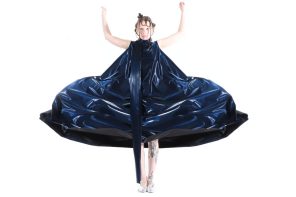Tess Norquay graduated with honours degree in Fashion Design from Massey University in 2016. Born in Auckland, raised in Wellington, Norquay is a self-proclaimed brunch, dog, and reality TV enthusiast. Currently building her brand under her name, Norquay said it was the easiest to remember for obvious reasons. “I’m also a lot less likely to get annoyed with the brand name I’ve chosen, and want to change it- it’s worked for me for 22 years,” she said.
Norquay had to pick an elective class in her second year of high school and at the time was a big fan of Project Runway. “I plucked textiles off the list. I thought it would be funny to waltz around the class pretending to be Tim Gunn. However, I ended up getting really into the class, at the expense of all my other classes, which was embarrassing because my joke backfired on me.”
At Massey University, Norquay said the ability to discuss and present her work to others and take critique on board during that process was crucial for her work. “It’s a difficult skill to master, given the personal nature of any creative discipline, but an invaluable one.”
iD Dunedin Fashion Week was a huge opportunity for Norquay and it almost passed her by. She almost didn’t apply due to post degree fatigue but is so happy she did. Showcasing her Please Like Me collection at the iD Emerging Designer Awards, Norquay won The Fabric Store Award for Excellence in Design. When she won, Norquay said it was ‘completely shocking’. “I had planned on popping out to the loos while everyone was distracted by the prize giving. I’m pretty pleased I didn’t, that would have been embarrassing. I was shaking like a small Chihuahua the entire way to receive my award. I won $2,000 in vouchers to the fabric store, and another $1,000 on top of that. I’m trying to be sensible, and not just whip myself up a new wardrobe. I think the entire award is going to go into making things to sell. It’s a big financial risk, in case it doesn’t work out, but the Fabric Store has made it possible.”
A highlight of this collection is the fluorescent orange jacket. Norquay had been in the middle of making it in a different fabric, just days from deadline, when she woke up sweating at 3am. She realised it was squealing at her to be made in the orange. “I listened to its squeals, cutting it out until 3am the following night. I resented it deeply at the time, but we’ve mended our relationship,” she explained.
Her collection, Please Like Me, started brewing when she realised it had become normal to refer to women as capitalist concepts such as damaged goods, upgrade, and cheap. She began to design prints that referenced advertising tropes, but interpreted them in a falsely earnest way. “The disembodied limb is a trope we all know and love (hate, deeply), but my disembodied limbs are cartoonish, misshapen, and hairy. The print still technically references the trope, but misses the mark. Whoops!”
The cartoon underwear print came from a similar concept, and explores the effect of projected patriarchal ideologies. Norquay explained that the silhouettes exist as a means to withdraw the wearer from the male gaze as they don’t offer any knowledge as to what the body underneath looks like. Many of the pieces look exactly the same on the hanger as they do on the body.
Norquay said the collection’s style is workwear meets streetwear if there was such a category. Please Like Me used a lot of visual tropes from workwear including pockets, hard-wearing fabrics, and high visibility. “It’s kind of a subtle nod to what one would expect a tradie to wear, while simultaneously being completely inappropriate for doing that kind of work.”
The social element of sustainable fashion is really important to Norquay. “I find it really sickening people are willing to turn a blind eye to fast fashion exploiting, and sometimes even killing workers from other countries just to look nice on a night out. Nothing about that is justifiable to me,” she added.
In terms of her design work, Norquay said she is almost invariably inspired by social issues and the way people interact with one another. Fashion for Norquay is a particularly interesting platform for discussion of said issues as it’s the only art form in which everyone is obliged to participate. Even opting out of fashion is still participation.
In terms of motivation, Norquay believes the work produced at Massey by her fellow students was always aspirational. “Being around people every day that love the same things as you do pushed me forward, even when I just felt like locking myself in a bathroom cubicle for hours at a time.”
In her design process, Norquay tries not to spend too much time at once doing either designing or sewing as that’s when things get stale or when things go wrong. “I’ll do one until I hit a roadblock, then switch to the other when I hit a roadblock, rather than trying to force my way through the road cones, so to speak.”
Commercialisation is now her biggest challenge as she tries not to lose her voice in a very noisy mob. Norquay is now working on a more solid game plan for her brand that will include an online store. With newfound confidence, she’s looking forward to finding her unique way.






